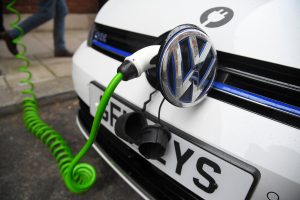 China unveiled its comprehensive new set of rules for emissions and delayed a program for credit-score tied to electric car production, giving automakers additional time to prepare for their phasing out of vehicles that are powered by fossil fuels.
China unveiled its comprehensive new set of rules for emissions and delayed a program for credit-score tied to electric car production, giving automakers additional time to prepare for their phasing out of vehicles that are powered by fossil fuels.
Under the policy of cap-and-trade, automakers have to obtain a new-energy score for vehicles, which is tied to production of various different types of low- and zero-emission vehicles, of a minimum of 10% beginning in 2019, then rising to 12% during 2020, said the Ministry of Information Technology and Industry in a post on its website.
This rule applies to automakers that make or import over 30,000 traditional autos each year and those who do not comply must purchase credits or face hefty fines.
China proposed previously to begin implementation of the policy in 2018, a target views by makers of autos as too ambitious. China has vowed by 2030 to cap carbon emission and to curb the growing air pollution problems. It joins nations such as France and the UK in seeking a programmed timetable to eliminate vehicles using gas and diesel. The country must use alternative energy in powering over 200 million vehicles using its roads and to reduce dependence on imports of oil.
These new targets appear to be achievable in the industry as a whole say analysts considering, the structure of the credit policy, 12% by 2020 would equal about 4% to 5% of the true vehicle sales for that year.
Honda Motor, which is planning to have an electric vehicle for sale next year in China, and is planning to expand the EV business moving forward, will work on achieving the targeted credit score, a spokesperson for the company said.
Earlier in September, the Beijing government said it was working on the timetable that would phase out vehicles powered by fossil fuels helping to lift shares for local car makers like BYD an automaker that is backed by billionaire investor Warren Buffett.
Groups such as Geely, BYD, Chery and a few others will end up with excess credits, say analysts.
While global automakers such as Tesla, Nissan and General Motors race to grab part of the market for electric vehicles in China, domestic makers like Geely Automobile Holdings have found solid success in the EV market due to general subsidies offered by the government.
